Amagi Brilliant Park
Short Synopsis: Our protagonist is kidnapped by an emotionless girl with a musket.
Ninjarealist’s Impression: A bitter and narcissistic ex-child star, a creepy and falling-apart theme park whose few visitors are outnumbered by vermin, a cast of characters named after American hip-hop stars: these are just a few of the bizarre elements that make up the first episode of Amagi Brilliant Park. And if you’re unable to imagine how all of that could fit neatly into one show, let me reassure you: this debut episode is laugh out loud funny. Comedy is probably the most subjective of genres, but what sets Amagi Brilliant Park apart from the crowd is that it’s quite clever. For example, the choice to name the main characters after hip-hop stars. It’s an inherently funny choice, but a lesser series might be content to simply play this for cheap jokes. But in Amagi Brilliant Park these names are actually used as ironic commentaries on the lead characters’ attributes. The emotionless girl, who is constantly shooting at people with a musket, is named after famed stoic and shooting victim, 50 Cent. The self-absorbed child-star protagonist takes his name from renowned narcissist Kanye West. That’s the type of subtle humor that this series uses. It doesn’t just stop at the usual manzai jokes (although it does those very well), it utilizes the bizarre setting and strange characters to play with the viewer’s expectations and force us to laugh at the morose absurdity of it all. In this way, Amagi Brilliant Park reminds me more of a show like Humanity Has Declined than the typical KyoAni fare that many expected this series to be.
A lot of what makes this show work so well is the excellent direction, which fleshes out the setting with lifelike visuals. Much of the humor in the first episode is driven by the surroundings, a theme park so poorly-maintained that it feels more like a haunted house than a place to unwind. And what really drives this home is the director’s use of short but intricate scenery shots that direct the viewer’s eyes to important details, which might be missed if they were placed in the background. Crows eating from a spilled trashcan, aging animatronics struggling to speak outdated lines, a bored child sitting with his parent in an empty auditorium, playing video games, as the uninspired show girls struggle to feel relevant: brief shots like this make the setting feel almost like another character in the show. This is gracefully mixed in with the comedy and never bores the viewer or verges into scenery porn. Much of these exposition shots are jokes unto themselves.
Amagi Brilliant Park is by no means a perfect show. There’s plenty of dumb fanservice and, while the dialogue is usually quite funny, it can sometimes feel extremely corny and derivative. That’s what worries me the most about this show. While I loved the first episode, it showed unmistakable signs that it might devolve into something less unique than what we see in the first episode. The use of dramatic flashbacks late in this episode suggests that this show intends to get serious at some point. And I have some doubts about whether this series can pull off drama as well as comedy. Still, this is was an impressive first episode and I’m excited to see where they go with it.
Potential: 70%
Psycho Pass Season 2
Short Synopsis: Our protagonist is a cop hunting criminals in a “Minority Report”-style dystopia.
Ninjarealist’s Impressions: Full disclosure, I really liked the first season of Psycho-Pass. The show had a lurid, hollywood, feel to it that made it seem almost as much like an American action movie as an episodic sci-fi anime. And as much as it pains me to say it, I’m just not really feeling as much of either influence from Psycho Pass 2, which seems much more rooted in modern anime. The main characters have gotten cuter, the soundtrack has cut down on the orchestral instruments and upped the amount of electronic ones, and the script, no longer written by Gen Urobuchi, doesn’t quite have the same edge to it. That’s not automatically a bad thing, but something seems like it’s missing from this sequel. Akane is still a badass, the premise is still great, and the setting is still super cool, but the show sort of feels like some of the life has been sucked out of it. There’s just not a whole lot in this first episode that compares favorably to the original series. With all of that being said, I still liked this first episode. While I’m disappointed that the staff seemed to be making a concerted effort to up the number of cute girls, I do like Shimotsuki’s character and I like how they’ve set her up to be so antagonistic towards Akane. It’s essentially the same relationship she had with Ginoza in the first season, but in reverse. And maybe that sounds boring to some of you but I for one am excited to see how Akane deals with an upstart who questions her authority. The new villain is also an obvious retread of the villain from the first season, but again, they’ve made some interesting choices with him that should provide some serious challenges for the main characters. If viewers can get past the fact that this show seems to be a downgrade in quality from the original Psycho Pass, I think they might find something to like here.
Potential: 65%

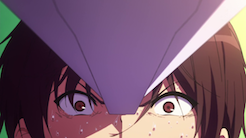
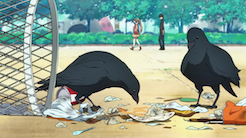
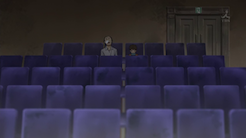
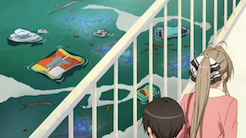
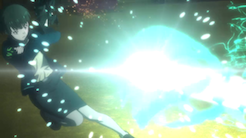
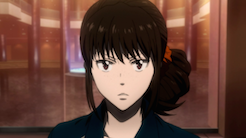
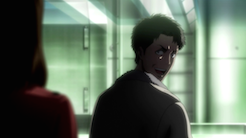

So Psycho Pass 2 … it was alright. The episode was competent but felt a bit derivative. I’m not sure if I like the new crew as much as the old one, at least not yet. The whole thing had a GITS:A feel to it, which is natural given Ubukata’s heavy involvement, but if I’m getting these type of action scenes I rather see Section 9 do it. The reveal at the end was the most interesting part of the episode honestly. Here’s hoping they switch gears a little bit.
I’m sure it’s partly because I wasn’t a huge fan of the original series, but I really enjoyed this first episode. It finally shifted the focus off of Sybil as a bland villain and more as reality used to explore its notions of society, which was what I wanted the original to do all along. No doubt the story will be more linear than the first half of the original Psycho-Pass, but the fact that it’s already building up the first layers, I have faith they’ll pull it off.
I also tend to find Ubukata’s writing much more interesting and all around more tolerable than Urobuchi’s writing, so I was already a bit biased towards this new season to begin with.
Tow Ubukata is gifted, no doubt, but he also relies too heavily on genre conventions, that’s why many of his works feel already exhausted. He seems to have forgotten that this isn’t GITS: Arise. Akane is not Major Kusanagi and never will be, so they should stop throwing her in high-octane action sequences and build her character in different, fresher, direction. This still has the room to get a lot better, but as it is now most original Psycho Pass fans (not fanboys) are not too pleased about it. I like to think that they might throw Shinya back into the mix at an opportune moment, but we’ll just have to wait and see.
No doubt, he’s a genre writer in all of the good and bad senses of the label. Still, I think he’s a better choice for this than Urobuchi, to whom the science fiction setting felt more like a convenient tool than anything else. The big challenge for Ubukata will be to keep all the different layers that he loves to stack balanced. It’s not uncommon for him to get so involved with his narrative threads that the main story gets all tangled up in them.
All that being said, I really don’t think Akane was written as a Kusanagi stand-in here. Sure, she was involved in an action scene, but aside from the fact that this only highlights the development of her character from last season, it wasn’t an athletic cyborg style of fight. Just general cop noir action with science fiction elements thrown in.
Of course, even as someone who really liked this season premiere, it’s clear that what we’ve seen is just the potential to be good, not a guarantee. Mostly, I’m just happy to see this show teasing that it will actually explore what I wanted it to explore in the first place, so part of my hype is definitely the “pleasant surprise” factor.
Inspectors shouldn’t even be this involved in the action; that’s why they have enforcers. Kusanagi is more than an athletic cyborg, she is also a top-tier hacker and inspector that resolves the situation with cold logical calculation, and Akane seems to have borrowed quite liberally from that. I don’t expect her to be all happy-go-lucky after last season’s developments but the question is what more does this bring to the table that hasn’t already been done better elsewhere?
Akane adopting (at least in part) the role of the enforcers is one of the issues that will be at the crux of the new season. Her doing that falls right in line with the beliefs she developed over the past season, and runs opposite this universe’s conventional thinking regarding inspector/enforcer relationships.
More importantly, despite the fact that her expressions and tone of voice are more unflinching and stern than they were before, she is not acting with cold, logical calculation here. She’s acting on personal ideals and nothing else. The cold, logical conclusion would have been to end the situation as quickly as possible. Instead, her actions not only risked the lives of all involved (and, if it’s as we’re led to believe, potentially costing a life, though that may or may not have been avoidable), but did so on what is an allegedly slim possibility. And she did all this in the hopes that she might have the opportunity to avoid killing the person they were pursuing (and possibly out of spite for Sybil). Honestly, her portrayal here is more “reckless” than “calm and calculating.”
That, to me at least, is a fairly interesting character setup; and is a sign that the staff are at least trying to build on what was already established previously. It could also lead to a much more dynamic look at sociological issues than the rather one-sided offering that we got in the first season. But, as I said before, it’s potential only at this point.
Inspectors were on the scene in last season’s premier as well, so this is nothing new, but one should contrast last season’s opening case with this to see that the series has taken a sharp turn away from noir, dark and gritty towards more mainstream scifi action.
Everything she does leading to the final confrontation is completely cold logical assessment, and her demeanor and tone again brings to mind Kusanagi’s. They are not the same character, so pointing out slight differences is pointless, but contrasting this portrayal with Urobuchi’s and considering that Ubokuta just rolled in here fresh from the set of GITS:A one can easily then deduce what happened. People familiar with Motoko’s character should know that behind her cold mannerisms is a caring individual with her own strong ideas of right and justice. Kusanagi has also in many instances risked everything to get the outcome that she desires, and this is no different form that.
The problem with season one’s first case is that there was a lot less interesting going on there than here. This episode lays a lot on the table, but in a way that hints at more to come from it. Season one’s first episode establishes its conclusion from the very outset, which is why I find season two’s premiere much more interesting. This might have been fine if the show stuck with a more procedural approach (I rather liked the sculptor and hunter arcs in the first half), but then it tried to work off a foregone conclusion, leading to its one-sided results.
And I’m aware that he just got off of GITS:A, but I don’t feel that her character is either being handled inappropriately or as being markedly similar to Kusanagi beyond superficial comparisons (as I can at least agree to his dialogue being tinged by his experience with GITS:A, though not to the detriment of the episode). I can’t agree that it’s cold, logical assessment either. She isn’t acting logically, she’s acting the opposite of that. Akane’s behavior is on a hope and a whim, despite her more rigid outer demeanor (which is appropriate for her at this point in the series). Kusanagi has her moments of recklessness, but her ultimate personality is that of an exceedingly capable soldier. Meanwhile, Akane’s recklessness is key to this new, more jaded version of the character, following naturally from season one’s close.
And, again, my interpretation (and overall view of this episode) is no doubt colored by the fact that I wasn’t that big a fan of the original series to begin with.
“I can’t agree that it’s cold, logical assessment either. She isn’t acting logically, she’s acting the opposite of that.” So you are saying that she is acting illogically for the entire investigation? If so that is simply untrue. She manages the case and her team competently and logically, and the only somewhat reckless behavior is only near the end confrontation. This attitude should be deemed more cocky then reckless, since as soon as she sees the flicker (and thus hope for reconciliation) she makes up her mind that she can still save him, and she’s proven to be right about that. This is a “moral” decision no doubt, yet still a logical decision within the framework she is working with. And again Kusanagi has had her share of cocky ethical decisions that she then competently pulls off. Nothing fascinatingly new here.
The original series was mot without its faults, yet it was able to tell a thought-provoking (albeit unoriginal) story with many mature elements. There wasn’t much edgy elements in this episode (I am judging merely what we have seen so far) compared to the shockingly brutal and violent season 1 premier. Kagari, Kogami and Masaoka all had their own distinct personality and charm that was clear from the 1st episode, while the new crew are either too bland or just rehashes of the old characters.
My main question still remains unanswered: what more does this bring to the table that hasn’t already been done better elsewhere?
As a fan of the original series and Urobuchi’s writing, I still think Nyangoro’s outlook is nearly parallel to my own. It’s not so much about whether Akane and Kusanagi are different from each other so much as it is how they differ that means the most in how I see the sequel developing. For one, Akane’s specific moral decisions derive directly from her thoughts and threats against the Sybil system. She didn’t take it down then and there because it would cause far more chaos in society than necessary. However, by following the system and making decisions like this to disregard it without contradicting it, she brings some control back to humanity. Like she said, the system eventually judged the man to be worth saving–it wasn’t a decision set in stone. In this case, the humans influenced the system and not the other way around. As a long-time fan of GitS, this is nothing like the premise or message of GitS. If it can branch off of Urobuchi’s open-ended set-up from the first season without falling apart, I will definitely consider this season to be a success, and maybe an improvement, on Urobuchi’s first season.
Amagi Brilliant Park seems a little corny at first glance and I didn’t really like it, but I honestly think that’s my own personal bias talking. I’m not usually one to grant romantic comedies the time of day, since they seem to cater to a very, very specific audience, however this screenplay was very well composed. All of the jokes fell into place without feeling forced, the events did not feel disjointed at all (despite being largely independent skits), and hell, even the queen of the faeries didn’t put me off the show as much as it should have otherwise. I looked at the staff for the show and noticed that the Fumihiko Shimo is the one responsible for this and everything just started making sense. The reason why I don’t hate this show as much as I thought I would is because the series composer is the same person that worked on the screenplay for every episode of Clannad and worked in series composition for Air and Golden Time. Clannad and Air are basically the only romantic anime I’ve ever watched to completion and Golden Time wasn’t half bad. I hated the fan service, but I thought the way they used it was amusing, having the girl’s reaction being so delayed and nonchalant. This show is guaranteed to be at least decent.
My main gripe is the music. It’s just so uninspired and is basically just stock filler music. I feel that it really puts a damper on the atmosphere.
Hopefully the music will improve over time. I guess it wasn’t that bad. I listened again. It actually was good, it just sounded too familiar for me.
I tend to agree that the music itself was nothing to write home about, but I was pleased by the amount of music used overall. I feel like the tendency with most shows these days is to overdo it with the music and I felt like this debut did a good job of knowing when to let off the music and just let the sound effects/visuals speak for themselves.
Looking at the opening more closely there sure will be some interesting stuff happening in the series when things get moving even more.
I liked the first episode and will certainly be waiting for more.